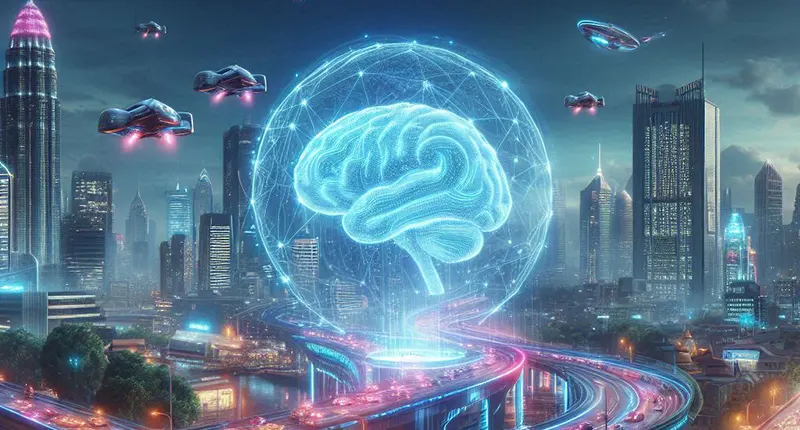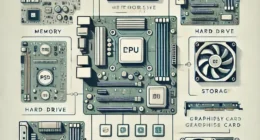Generative AI is transforming technology and our daily lives. Unlike traditional AI, generative AI creates new content based on patterns and examples. It produces text, images, code, and even music that mimic human creativity. As a result, generative AI will impact various industries and change how we interact with technology.
Table of Contents
- Explain the basics Why Generative AI Matters for the Future of Technology
- Generative AI in Industries
- Explain Enhancing User Experience Why Generative AI Matters for the Future of Technology
- How Generative AI Drives Automation
- Ethical and Security Considerations
- Future Possibilities with Generative AI
- Conclusion of Explain Why Generative AI Matters for the Future of Technology
Explain the basics Why Generative AI Matters for the Future of Technology
To understand its importance, we should first understand what generative AI does. At its core, generative AI uses complex algorithms and deep learning models. It trains on large datasets, learning patterns and relationships within the data. For instance, ChatGPT, a popular generative AI, trains on vast text data. This training enables it to answer questions, write essays, and even create new stories.
Generative AI models often use neural networks. These networks simulate how the human brain processes information. Two main techniques drive generative AI:
- Transformers: These models process sequential data like language.
- GANs (Generative Adversarial Networks): GANs use two networks to create realistic images and sounds.
Generative AI systems can produce a variety of outputs:
- Text (e.g., articles, summaries, code)
- Images (e.g., designs, art)
- Audio (e.g., music, speech)
- Simulations (e.g., scientific models)
Generative AI in Industries
Generative AI benefits many sectors and can enhance existing systems or create new possibilities. Here’s how it impacts major industries:
Healthcare
Generative AI is transforming diagnostics and treatment. For instance, AI-generated images help doctors spot diseases in radiology scans. Generative models also help researchers create new drugs faster by simulating molecular structures. Personalized treatment can become a reality as AI analyzes data unique to each patient.
Entertainment and Media
AI-driven tools now create realistic animations, edit images, and even write scripts. Filmmakers use AI to produce lifelike characters, while game developers rely on it to design complex worlds. These tools reduce production time and give artists more freedom to focus on creative ideas.
Finance
In finance, generative AI improves fraud detection and risk management. AI models analyze financial patterns and predict potential threats. AI-powered chatbots also engage customers, answering queries and solving problems in real-time.
Education
Generative AI personalizes learning experiences. It generates tailored study plans and answers students’ questions instantly. Teachers can also use it to generate resources, making classes more interactive.
Explain Enhancing User Experience Why Generative AI Matters for the Future of Technology
Generative AI plays a critical role in enhancing the user experience (UX). Many companies now use AI to improve how customers interact with their platforms. For example:
- Voice Assistants: Generative AI powers voice assistants like Alexa, Siri, and Google Assistant. These assistants can now answer complex questions and even hold conversations.
- Content Personalization: Streaming platforms and online stores use AI to recommend movies, products, and services based on users’ preferences.
- Chatbots: AI chatbots provide fast, efficient customer support. They handle tasks like booking appointments and answering queries without human intervention.
These applications improve customer satisfaction and boost business efficiency. Customers experience quicker responses, and businesses save on operational costs.
How Generative AI Drives Automation
Automation is a key focus of generative AI. It reduces repetitive tasks, helping industries streamline operations. For instance:
- Code Generation: AI models can now write and debug code, helping developers automate software development.
- Data Analysis: Generative AI analyzes vast amounts of data to find patterns and trends, saving time for data scientists.
- Content Creation: AI tools generate content for marketing campaigns, reducing the workload for human writers.
These advancements mean employees can focus on strategic tasks instead of manual ones. Generative AI automates mundane tasks, making workflows faster and more efficient.
Ethical and Security Considerations
Despite its benefits, generative AI poses ethical and security risks. For example:
- Deepfakes: Generative AI can create fake images and videos, which can spread misinformation.
- Bias in Data: AI systems can learn biases if they train on unbalanced data. This issue is especially critical in hiring, healthcare, and law.
- Privacy Concerns: AI systems collect large amounts of data, raising privacy concerns. Users often don’t know how their data is used or stored.
To address these risks, companies need transparent and ethical AI practices. Governments are also working to create regulations around AI, aiming to make AI safer for everyone.
Future Possibilities with Generative AI
Generative AI will become more powerful and integrated across industries. Here are some possible future applications:
- Personalized Healthcare: AI could create individual health plans based on a person’s unique genetic makeup.
- Smart Cities: AI-powered city systems could manage traffic, reduce pollution, and improve public services.
- Education Revolution: AI could tailor learning to each student’s pace, making education more effective and accessible.
Generative AI will shape the future of technology, pushing boundaries and creating new possibilities.
Conclusion of Explain Why Generative AI Matters for the Future of Technology
I thing now you have a good understanding about Why Generative AI Matters for the Future of Technology. Generative AI is more than just technology. It’s a revolution that will change every sector, shape new user experiences, and drive automation. But as it grows, we must consider ethical questions, ensuring AI benefits society as a whole.









